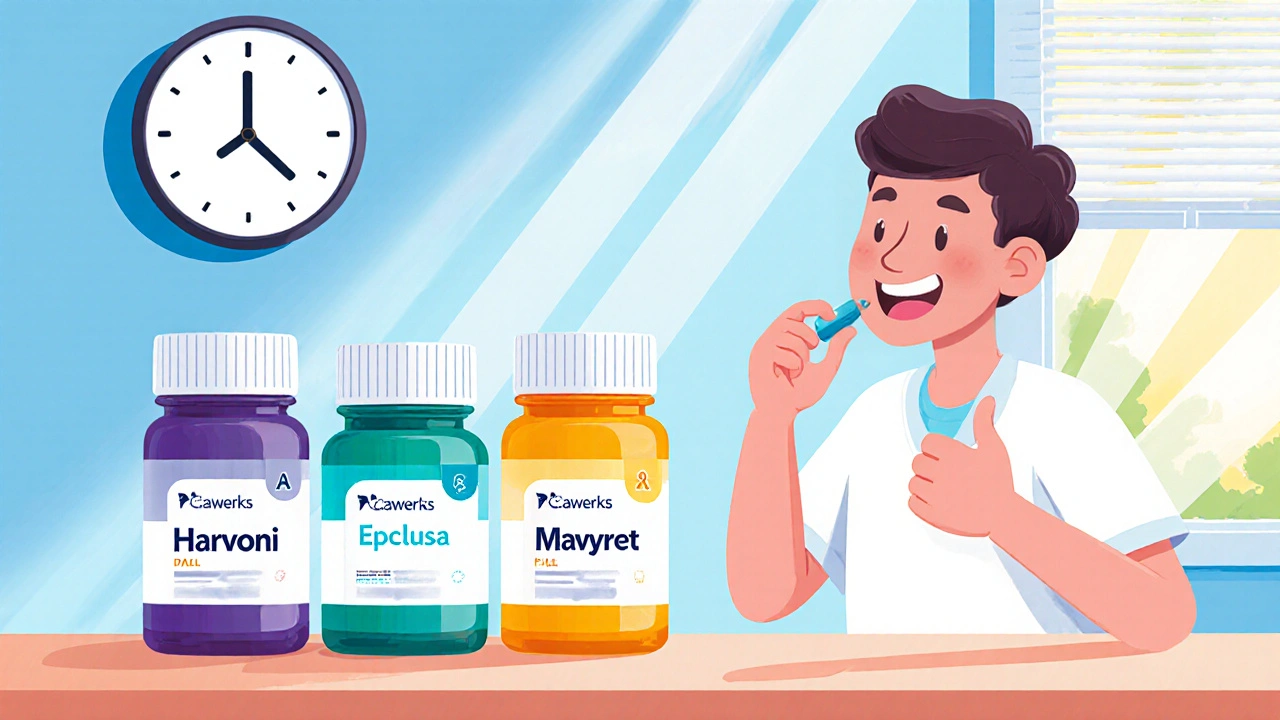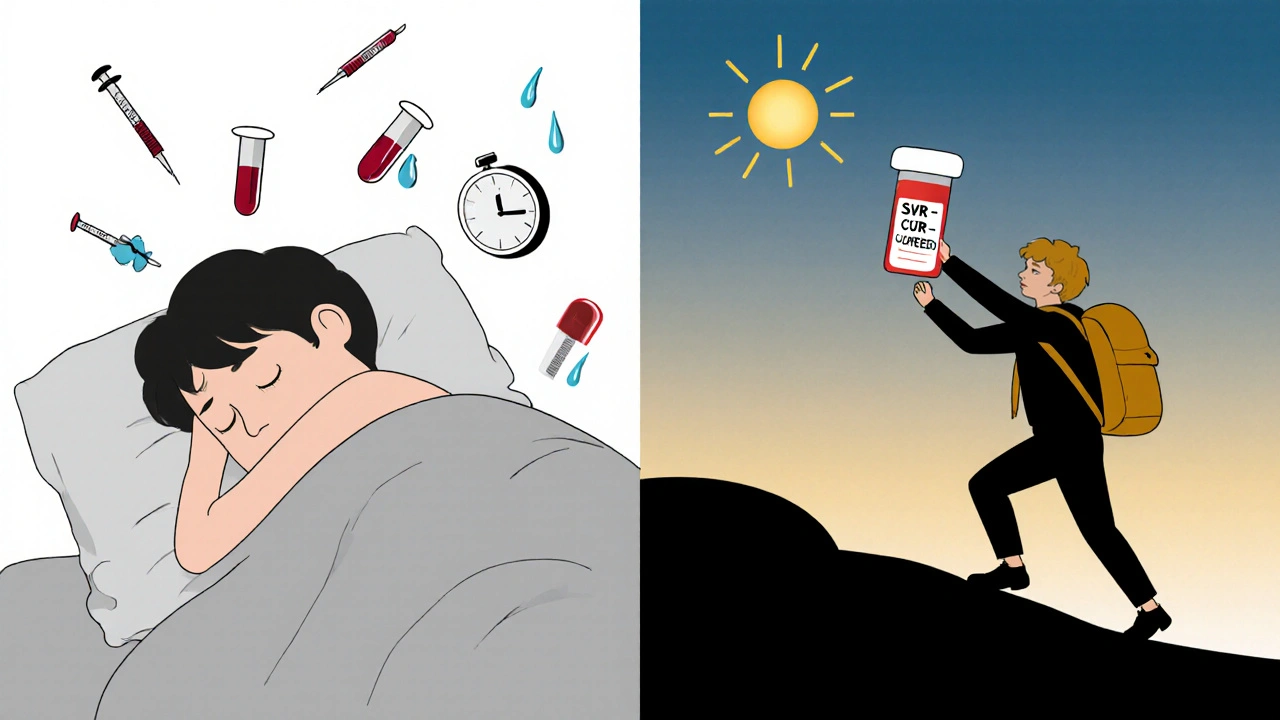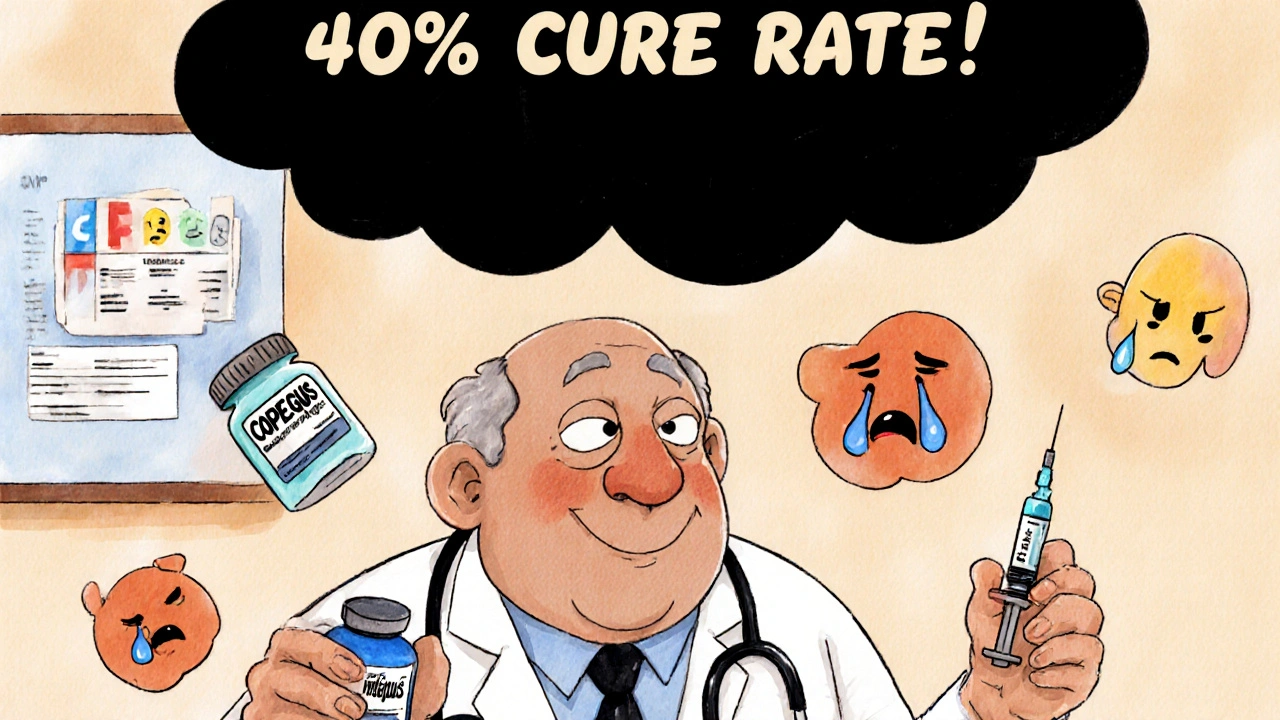Hepatitis C Treatment Comparison Tool
Copegus + Interferon
$500 - $1,500 AUDDuration: 24-48 weeks
Side Effects: Severe anemia, depression, flu-like symptoms
Cure Rate: 40-60%
Harvoni (Sofosbuvir/Ledipasvir)
$1,200 - $2,500 AUDDuration: 8-12 weeks
Side Effects: Mild headache, fatigue
Cure Rate: 97-99%
Epclusa (Sofosbuvir/Velpatasvir)
$1,800 - $3,000 AUDDuration: 12 weeks
Side Effects: Mild nausea, insomnia
Cure Rate: 98%
Mavyret (Glecaprevir/Pibrentasvir)
$1,600 - $2,800 AUDDuration: 8 weeks
Side Effects: Mild fatigue, diarrhea
Cure Rate: 99%
Recommended Treatment
Treatment Comparison
| Option | Duration | Cost (AUD) | Side Effects | Cure Rate | Recommended |
|---|---|---|---|---|---|
| Copegus + Interferon | 24-48 weeks | $500 - $1,500 | Severe: anemia, depression | 40-60% | |
| Harvoni | 8-12 weeks | $1,200 - $2,500 | Mild: headache, fatigue | 97-99% | |
| Epclusa | 12 weeks | $1,800 - $3,000 | Mild: nausea, insomnia | 98% | |
| Mavyret | 8 weeks | $1,600 - $2,800 | Mild: fatigue, diarrhea | 99% |
Back in the 2000s, if you had hepatitis C, your doctor might have handed you a prescription for Copegus - the brand name for ribavirin. It came with a long list of side effects: crushing fatigue, anemia, rashes, and depression. And it wasn’t even a cure on its own. You had to take it with interferon injections, which made you feel like you were fighting a flu that never ended. Today? That’s not how hepatitis C is treated anymore.
Why Copegus (Ribavirin) Is Rarely Used Alone
Copegus contains ribavirin, an antiviral drug that was once the backbone of hepatitis C treatment. But ribavirin doesn’t kill the virus by itself. It works by messing with the virus’s ability to copy its genetic material. When paired with interferon, it boosted cure rates from under 10% to around 40-50%. That was a big deal back then.
But here’s the problem: ribavirin is hard on your body. It causes hemolytic anemia - your red blood cells break down faster than your body can replace them. That means frequent blood tests, iron supplements, and sometimes even blood transfusions. For people with heart disease or kidney problems, it’s too risky. And if you’re a woman of childbearing age, you need to use two forms of birth control during treatment and for six months after. Why? Because ribavirin can cause severe birth defects.
The New Standard: Direct Acting Antivirals (DAAs)
Since 2013, a new class of drugs called direct acting antivirals (DAAs) has taken over. These pills target specific parts of the hepatitis C virus - the NS3/4A protease, NS5A protein, or NS5B polymerase - and shut them down. No interferon. No ribavirin. Just one pill a day for 8 to 12 weeks.
Studies from the World Health Organization and the U.S. CDC show cure rates above 95% with DAAs. That’s not a slight improvement. That’s a revolution. Patients report feeling better within days. No more weekly shots. No more months of exhaustion. No more hospital visits just to manage side effects.
Popular DAA combinations include:
- Sovaldi (sofosbuvir) + Ledipasvir (Harvoni)
- Epclusa (sofosbuvir + velpatasvir)
- Mavyret (glecaprevir + pibrentasvir)
- Vosevi (sofosbuvir + velpatasvir + voxilaprevir)
These are all taken orally. Most are covered by Medicare in Australia and similar public health systems elsewhere. You don’t need to be a specialist to prescribe them anymore - general practitioners can handle them now.
When Is Ribavirin Still Used Today?
So if DAAs are so much better, why does anyone still use Copegus?
There are three real cases where ribavirin might still be added to treatment:
- Genotype 3 with cirrhosis - Even with newer drugs like Epclusa, some patients with advanced liver scarring still get ribavirin added to improve cure rates. Studies from the European Association for the Study of the Liver show a 5-10% boost in sustained virologic response when ribavirin is added in these cases.
- Re-treatment after DAA failure - If a patient’s hepatitis C comes back after one or more DAA courses, doctors may add ribavirin to a new combination like Vosevi to increase effectiveness.
- Resource-limited settings - In some low-income countries, DAAs are still too expensive. Ribavirin with interferon remains the only affordable option, even though it’s outdated.
But even in these cases, ribavirin is never used alone. It’s always a supporting player.

Cost Comparison: Copegus vs. DAAs
When people hear the price of DAAs, they panic. Harvoni used to cost over $90,000 for a full course in the U.S. But prices have dropped dramatically since generics became available.
Here’s what it looks like now (2025 prices, Australia-based):
| Treatment | Duration | Cost (AUD) | Side Effects | Cure Rate |
|---|---|---|---|---|
| Copegus + Interferon | 24-48 weeks | $500-$1,500 | Severe: anemia, depression, flu-like symptoms | 40-60% |
| Harvoni (sofosbuvir/ledipasvir) | 8-12 weeks | $1,200-$2,500 | Mild: headache, fatigue | 97-99% |
| Epclusa (sofosbuvir/velpatasvir) | 12 weeks | $1,800-$3,000 | Mild: nausea, insomnia | 98% |
| Mavyret (glecaprevir/pibrentasvir) | 8 weeks | $1,600-$2,800 | Mild: fatigue, diarrhea | 99% |
Notice something? The most expensive DAA still costs less than a year of interferon therapy. And the cure rate is nearly double. In Australia, most DAAs are subsidized under the PBS (Pharmaceutical Benefits Scheme). That means patients pay as little as $30 per script - or nothing at all if they have a concession card.
What About Generic Ribavirin?
Yes, generic ribavirin exists. It’s sold under names like Ribasphere or Rebetol. But here’s the catch: even the cheapest version doesn’t come close to matching the safety and effectiveness of modern DAAs.
Generic ribavirin might cost $200 for a 12-week course, but you still need interferon. And interferon isn’t cheap - it’s not even available over the counter. You need regular blood tests, specialist visits, and time off work. The total cost of treatment, including lost wages and medical visits, often exceeds $5,000.
Plus, the emotional toll is real. One patient from Adelaide told me: “I cried every week for six months. I didn’t recognize myself.” That’s not a side effect. That’s a life interruption.

Who Should Still Consider Ribavirin?
There’s only one group who might still benefit from ribavirin: people who can’t access DAAs due to insurance restrictions or geographic isolation. Even then, it’s a last resort.
If you’re in Australia and have Medicare, you can get DAAs with no out-of-pocket cost if you meet the criteria. Your GP can refer you to a liver specialist, and the script is processed through the PBS. No need to fight insurers. No need to wait.
If you’re outside Australia and ribavirin is your only option, talk to organizations like the Global Hepatitis Initiative. They help connect patients to low-cost DAA programs in places like India, Egypt, and Pakistan.
Final Decision: Is Copegus Worth It in 2025?
No. Not really.
Even if you’re on a tight budget, the cost of ribavirin plus interferon - in time, money, and health - is far higher than the upfront price of a DAA. And the risk of the virus coming back? That’s not worth gambling with.
Today, hepatitis C is curable in almost every case. You don’t need to suffer through months of illness to get there. The tools are here. The treatment is simple. The results are nearly perfect.
If you or someone you know is still on ribavirin, ask your doctor: “Is there a DAA option for me?” That question could change everything.
Is Copegus still used for hepatitis C?
Copegus (ribavirin) is rarely used alone today. It’s only added to modern DAA treatments in specific cases, like genotype 3 with cirrhosis or after previous DAA treatment failed. It’s no longer part of first-line therapy because newer drugs are safer and more effective.
What are the main alternatives to Copegus?
The main alternatives are direct acting antivirals (DAAs) like Harvoni, Epclusa, Mavyret, and Vosevi. These are single-pill regimens taken for 8 to 12 weeks with cure rates above 95%. They don’t require interferon and have far fewer side effects.
Are generic DAAs available and affordable?
Yes. Generic versions of sofosbuvir, ledipasvir, and other DAA components are widely available in Australia under the PBS. Most patients pay $30 or less per script. In many countries, generic DAAs are sold for under $100 for a full course through licensed international suppliers.
Can ribavirin cure hepatitis C by itself?
No. Ribavirin has never been able to cure hepatitis C on its own. It only works when combined with interferon - and even then, cure rates were low. Modern DAAs work alone and are far more effective.
What are the biggest side effects of ribavirin?
The most serious side effect is hemolytic anemia, which causes fatigue, dizziness, and shortness of breath. Other common effects include depression, irritability, rash, cough, and trouble sleeping. Pregnant women or those planning pregnancy must avoid ribavirin entirely due to high risk of birth defects.
How long does hepatitis C treatment take today?
Most DAA treatments last 8 to 12 weeks. Some patients with simple cases can be treated in just 8 weeks. After treatment, a blood test 12 weeks later confirms if the virus is gone. This is called a sustained virologic response - or SVR - and it means you’re cured.


Sierra Thompson
It’s wild how medicine can evolve so fast and yet so many still cling to the old ways. Ribavirin felt like a sentence. I watched my uncle go through it-no joy, no relief, just a slow erosion of his spirit. Now we have pills you can swallow with coffee and be done in two months. The science isn’t just better-it’s humane.
It’s not about cost. It’s about dignity.
Khaled El-Sawaf
Let’s be clear: the pharmaceutical industry didn’t develop DAAs out of altruism. They did it because the profit margins on interferon were collapsing. The real story here isn’t medical progress-it’s corporate recalibration. Ribavirin was discarded not because it was ineffective, but because it couldn’t be monetized at $90k per course anymore.
Don’t mistake capitalism for compassion.
Nawal Albakri
DAAs? Yeah right. You think they’re really curing people or just hiding the virus until it comes back worse? I read a guy on a forum who got treated with Epclusa and two years later his liver was worse than before. They don’t tell you that. They don’t tell you about the long-term immune damage. The CDC? WHO? All funded by Big Pharma. You think they’d admit the truth?
They’re selling hope. And you’re buying it.
And don’t even get me started on the birth control thing. That’s not medicine-that’s control.
Megan Oftedal
Wait, so if I’m in Australia and I have Medicare, I just walk into my GP and get a cure? No paperwork? No waiting? That sounds too good to be true. I’ve been trying to get my sister on treatment in Texas and we’ve been stuck in insurance limbo for 14 months. Is this really how easy it is over there? I feel like I’ve been living in a different country.
Also, can someone explain why ribavirin causes anemia? I googled it and now I’m terrified.
Musa Aminu
America thinks it invented medicine. Meanwhile, in Nigeria, we’ve been using traditional herbs for hepatitis for centuries. The real cure? Ginger, neem, and bitter leaf tea. But no, you need a $3000 pill because your system is broken. DAAs? More like Dumb Asses’ Pills. You pay for branding, not healing.
Our grandmothers knew more than your PhDs.
robert maisha
The paradigm shift from interferon to DAAs represents not merely a therapeutic advancement but a redefinition of the patient-provider relationship. Where once treatment was a prolonged ordeal requiring institutional mediation it is now a private act of self-care facilitated by pharmacological precision. The moral weight of this transition cannot be overstated. We moved from suffering as a rite to healing as a right.
And yet we still speak in terms of cost and access as if biology were a commodity.
It is not.
Alexander Ståhlberg
Let me tell you about my cousin. She was diagnosed in 2018. Told she had genotype 3 with early cirrhosis. They wanted to put her on Epclusa plus ribavirin. She cried for three days. She didn’t want to be the person who had to take a drug that could ruin her chances of ever having kids. She was 29. She didn’t want to be defined by a virus or a pill.
They didn’t tell her the truth until she pushed. That ribavirin wasn’t even necessary. Just a legacy protocol. She got Epclusa alone. Two months. No side effects. Blood test came back undetectable. She’s planning a wedding now.
That’s what this is about. Not cost. Not science. It’s about letting people live.
Robert Andersen
I used to work at a clinic in rural Oregon. We had a guy who drove 4 hours every week for interferon shots. He lost his job. His wife left. He’d sit in the waiting room with his oxygen tank just to get his shot. Then in 2021 we got our first batch of generic Mavyret. He took it at home. Two months later he came back to thank us. He was mowing his lawn again. He didn’t even know how tired he’d been until he wasn’t anymore.
That’s the real win. Not the stats. Not the price tags. It’s the lawn.
Eric Donald
One thing I appreciate about this post is how it doesn’t demonize ribavirin. It was the best tool we had then. It saved lives when nothing else could. The fact that we’ve moved beyond it doesn’t erase its role. It just shows how far we’ve come.
And to those still stuck with it? You’re not forgotten. You’re just waiting for the system to catch up. Keep asking. Keep pushing. Someone’s listening.
Brenda Flores
Just got my DAA prescription today. $28 with my Medicare card. I cried. Not because it was cheap. Because I finally feel like I’m not a burden. I’ve had this since 2010. Tried everything. Failed. Felt broken. Now? I’m just… me again.
Thank you to the scientists. To the pharmacists. To the doctors who didn’t give up. I’m cured.
And yes I spelled cured right this time. I’m not lazy. I’m just emotional.
Jackie R
Anyone who still uses ribavirin is either ignorant or complicit. This isn’t a debate. It’s medical malpractice. If your doctor still prescribes it as first-line, find a new one. Period.
Josh Arce
DAAs are just a fad. Wait till the next virus comes. They’ll be back to interferon and ribavirin. They always go back. Pharma just wants you hooked on new pills every few years. This is capitalism. Not medicine.
Also ribavirin was fine. I did it. I lived. You didn’t.
Eli Grinvald
Just wanted to say thank you for writing this. I’ve been reading about hepatitis C for months trying to understand what’s happening to my mom. This made it real. Not just numbers. Not just jargon. Just… human.
❤️
Alexis Hernandez
Imagine if every disease had a story like this. Imagine if every patient didn’t have to fight their insurance company just to get a cure. Imagine if doctors weren’t forced to be gatekeepers instead of healers.
DAAs didn’t just change hepatitis C. They showed us what medicine could look like if we actually cared.
Let’s not go back.
brajagopal debbarma
So DAAs cost $3000 but ribavirin costs $200? Wow. I guess the real scam is that they didn’t just make the old drug better. They made it *expensive*. Genius. I bet the guy who invented ribavirin is rolling in his grave. Or maybe he’s just laughing at us.